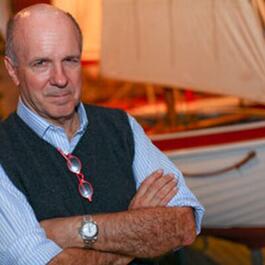
Simon Winchester | a History of Precision Engineering and the Making of the Modern World
In Episode 52 of Hidden Forces, Demetri Kofinas speaks with Simon Winchester about the value of precision (and imperfection) in the modern age. Few things are as responsible for the making of the modern world as precision engineering; yet, it is largely invisible to us. We live our lives in a customizable fashion, expecting the world to conform to our expectations, wants, and desires. And yet, below this surface layer of personalization and complexity exists a world of exactness so precise that it evades our capacity to notice it. It is this world of increasing perfection, uniformity, and repetition that Simon Winchester writes so eloquently about. This conversation is neither a salute to precision nor a rebuke of perfection. It is a commentary on both the genius brought to bear by humanity in reshaping the world, as well as an homage to the craftsmanship and personal touch that has given it meaning. Our endless striving for that which is flawless is most human. Yet, try as we might, we cannot rid the world of all its imperfections. Humanity, after all, is by its very nature hopelessly, beautifully, fatally flawed. "To err is human," said Alexander Pope. Forgiveness is divine. In chronicling the history of precision engineering, Simon Winchester, has not only found something forgivable in humanity's shortcomings but indeed, something worthy of honor and celebration. In his book, "The Perfectionists: How Precision Engineers Created the Modern World" Winchester asks whether a wish for perfection is actually essential to modern health and happiness, whether it is "a necessary component of our very being?" He answers with a resounding, "no." Yet, the problem, as Winchester articulates it, is not simply an existential one. It is a technical one as well. For proof, we've only to look to our jet engines, where microscopic errors can quickly cause cascading problems that lead to catastrophic loss of life. In fact, this is exactly what happened in 1989 on a United Airlines flight, when a microscopic metallurgical defect in the titanium disk caused the engine to fail. 112 people died as a result. Unfortunately, such tales aren't relegated to the annals of history. Many similar events have occurred in the decades since. If the past is any guide, then as our technologies continue to multiply (we made 13 trillion transistors each second of 2015) and shrink in size, we can expect the threats associated with them to become larger and more pronounced. In today's episode, Simon Winchester joins host Demetri Kofinas for a conversation that is equally a discussion of the significance of exponential technologies, an investigation into the kind of world we want to build, and an exploration of what it means to have a life well lived. Producer & Host: Demetri Kofinas Editor & Engineer: Stylianos Nicolaou Join the conversation on Facebook, Instagram, and Twitter at @hiddenforcespod
From "Hidden Forces"




Comments
Add comment Feedback